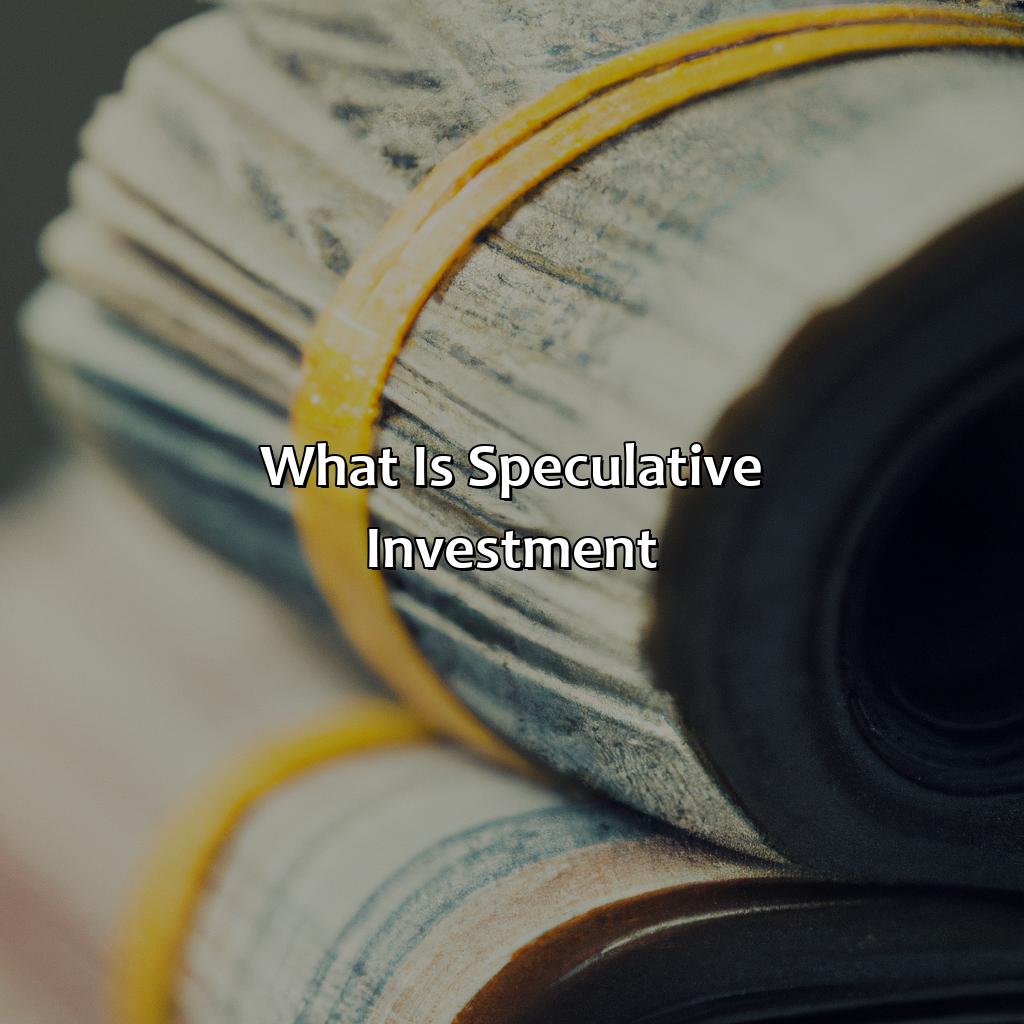What Is Speculative Investment?
Key Takeaway:
- Speculative investment involves high risk and potential for high return: It refers to investments with a high degree of uncertainty and risk. While they have the potential for high returns, investors must be aware of the risks involved and make informed decisions.
- Examples of speculative investments include cryptocurrencies, penny stocks, and artwork and collectibles: These investments have a high degree of volatility and lack regulation, making them inherently risky. Investors should thoroughly research and analyze these investments before putting money into them.
- Pros and cons of speculative investment: The potential for high returns and diversification are pros, while the high risk and lack of regulation are cons. Investors should carefully consider these factors and their own risk tolerance before investing in speculative investments.
Worried about the risks of traditional investments? You’re not alone! This article will explain the concept of speculative investments, helping you to make the right decisions for your financial future.
Definition of Speculative Investment
A Speculative Investment refers to an investment strategy that involves high risk and potential high returns. Investors engage in Speculative Investments with the intention of making a profit, but there is also a significant chance of losing money. Speculative Investments include buying stocks of a small or newly established company, investing in highly volatile markets, or investing in commodities with uncertain market values. These investments require extensive research and analysis to minimize risks and make informed decisions.
It is essential to note that Speculative Investments are not suitable for risk-averse investors, as they carry a high level of risk. Despite the potential for high returns, investors must be prepared to lose all or most of their investments. It is advisable to diversify the investment portfolio and seek professional advice before engaging in Speculative Investments.
According to a report by Forbes, Speculative Investments have become increasingly popular among individual investors during the COVID-19 pandemic. The report highlights that novice investors are engaging in high-risk investments without fully understanding the potential risks, which has resulted in significant losses. Therefore, it is crucial to be well-informed before making any investment decisions.
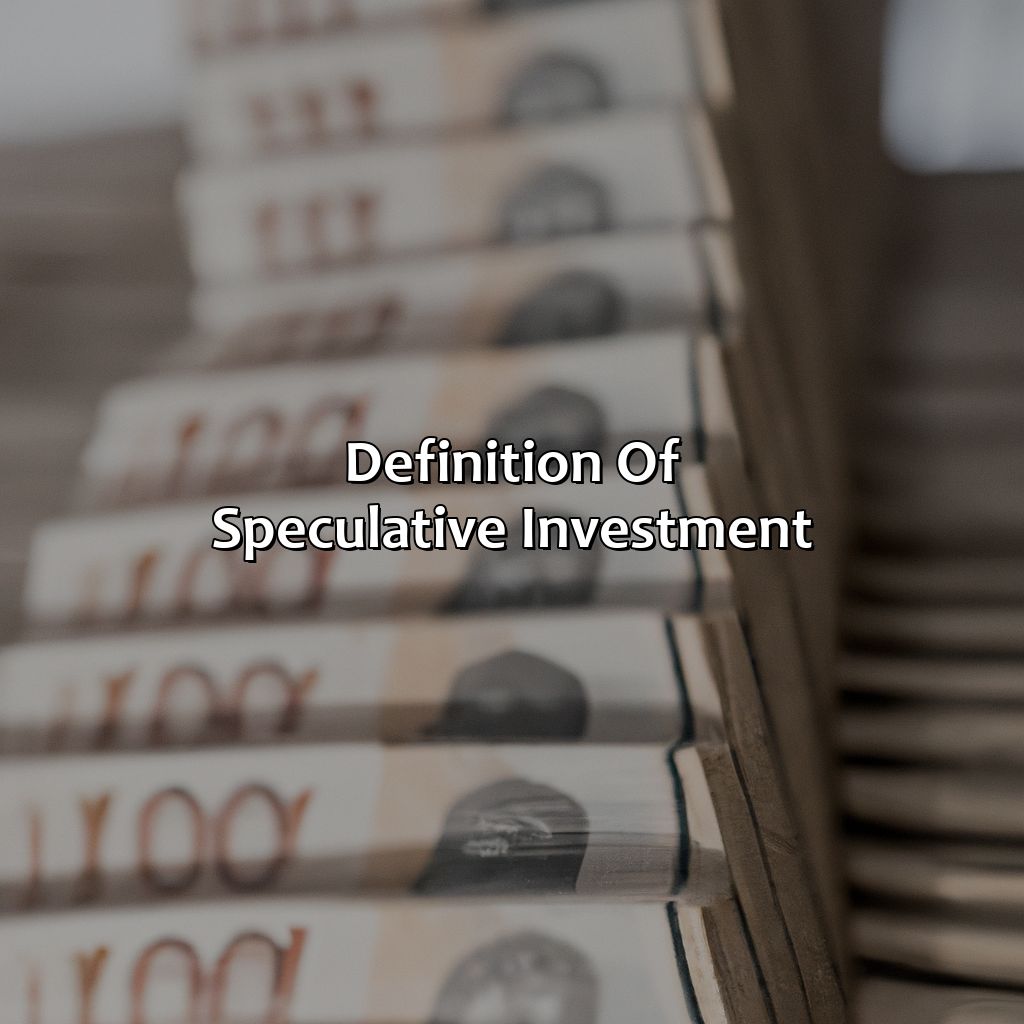
Image credits: retiregenz.com by James Arnold
Characteristics of Speculative Investment
Speculative investments have ‘High Risk, Potential for High Return’ sections. However, they are not for the faint of heart. This section explains their defining traits. These include: high risk and the potential for huge returns. Get to know this before considering it as an option!
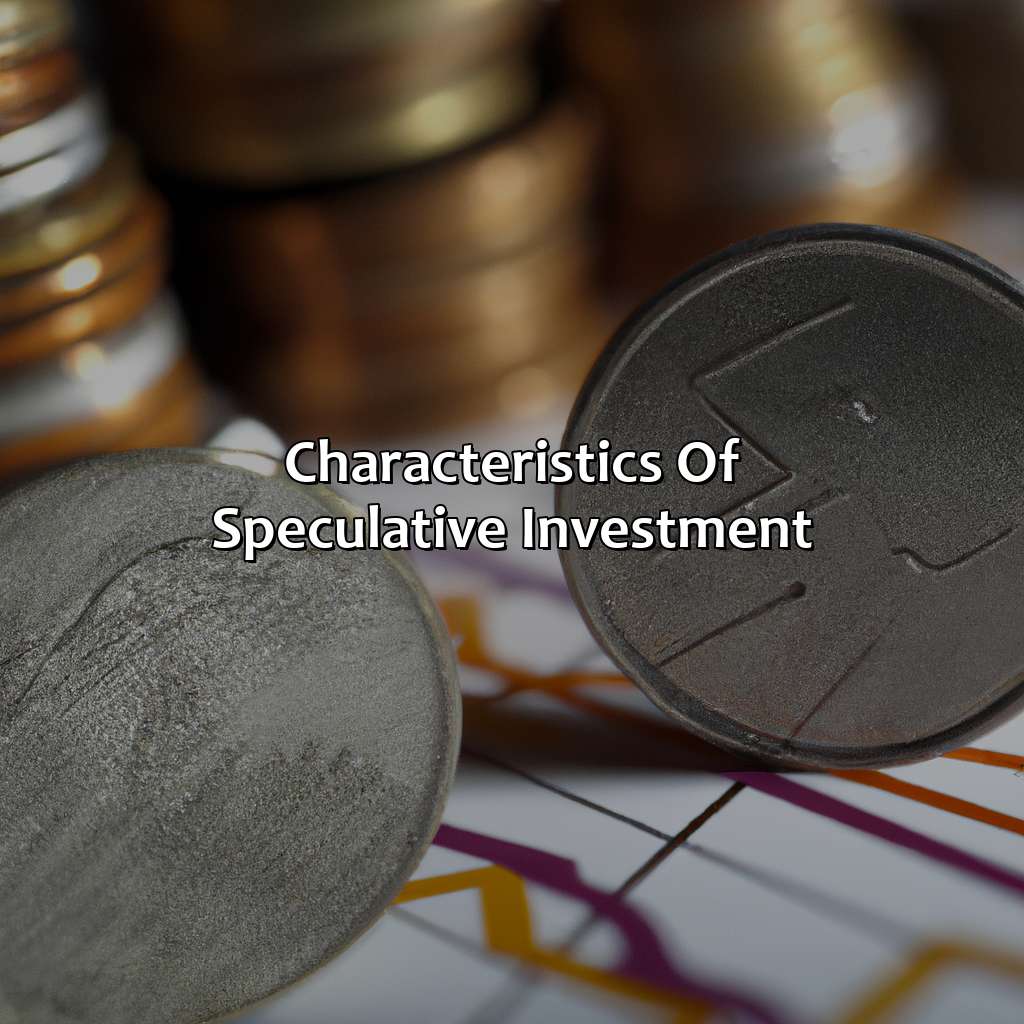
Image credits: retiregenz.com by Joel Duncun
High Risk
Investment characterized by high potential losses and uncertainty regarding returns. It involves risks beyond typical market fluctuations and involves significant volatility in the prices of underlying assets. Speculative investments, such as options, futures, and cryptocurrencies, can lead to substantial gains or losses.
Speculative investment has no traditional valuations or fundamental metrics to justify valuations. Instead, it is driven by psychological factors such as fear, greed, and rumors. This investment approach involves focusing on short-term price movements instead of long-term growth prospects and is usually based on imperfect information.
It is crucial to note that speculative investments are not suitable for all types of investors since they present substantial risks. Investors should undertake a thorough understanding of individual securities before engaging in any speculative activities, including carefully analyzing market conditions and having a viable strategy that takes into account potential losses.
According to Forbes’ study on “investor behavior,” over 65% of investors who engage in trading options lose money due to speculation. Thus it’s essential to invest wisely for risk management purposes.
Speculative investing is like playing the lottery, except you can’t use the excuse ‘I didn’t know the numbers were rigged’ when you lose.
Potential for High Return
Speculative investments are characterized by the potential for high returns. Such investments are considered high risk and often involve significant uncertainty regarding their outcome. Investors who engage in speculative investments hope to earn substantial profits but must bear the risk of losing their entire investment.
One primary advantage of speculative investment is the chance to yield significant returns in a short time. However, it is challenging to determine precisely when such an investment will generate profits or losses, and there is no guarantee that the money invested will yield expected results.
Speculative investments are not suitable for everyone and should only be considered by individuals with a high tolerance for risk. The maximum investment amount should also be limited to ensure that investors can afford any possible outcome.
According to Forbes, “Only invest what you’re prepared to lose” when it comes to speculative investments. It’s always best to seek professional advice before investing any money in such ventures.
Get ready to speculate, because these investments are more unpredictable than a blindfolded game of darts in a hurricane.
Examples of Speculative Investments
To comprehend the varying speculative investments, let’s explore the examples! People who need to gain wealth quickly invest in cryptocurrencies, penny stocks, and artwork and collectibles. Each of these have their own risks and rewards. Let’s look into each example closely!
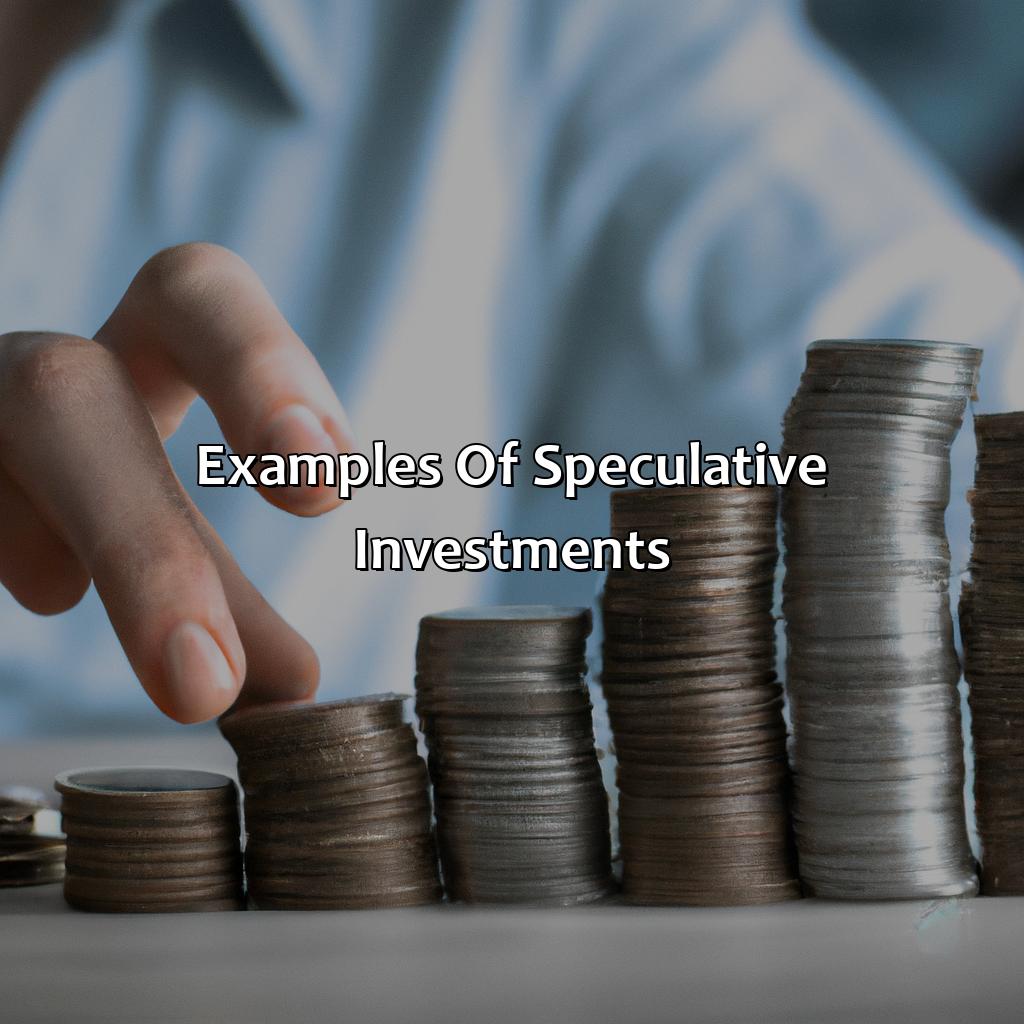
Image credits: retiregenz.com by Adam Washington
Cryptocurrencies
Investors are increasingly turning to digital assets for speculative investments. Cryptocurrency refers to virtual or digital currency that uses encryption techniques to verify transactions and control the creation of new units. As a result, cryptocurrencies are decentralized, making them independent of traditional banking systems.
Cryptocurrencies have experienced significant volatility in their valuations, which may lead to high returns but also substantial losses. Investors must conduct extensive research and due diligence before investing in cryptocurrencies as they face a considerable risk of fraud and hacking. Despite the risks, many investors still consider cryptocurrencies as viable options for diversifying their portfolios.
It is crucial to note that cryptocurrency investments require discipline and an understanding of market fluctuations. Prices can change rapidly with little warning, so it is essential to monitor investments closely and keep up-to-date on industry trends.
Investors interested in cryptocurrencies should educate themselves thoroughly on the market’s upsides and downsides before investing any funds. It would be best if you considered working with professional investment advisors who can guide you through the potential risks involved properly.
Don’t miss out on opportunities presented by digital assets; invest wisely now!
Penny stocks, because who needs stability and security when you can have a heart attack inducing rollercoaster ride with your investments?
Penny Stocks
Penny stocks, inexpensive securities traded in minor markets, require speculation to gain profit. Here are 5 points on why people invest in these types of stocks:
- They are less expensive
- Higher chances of quick returns
- Market Analysis is easier
- Technology makes monitoring and trading efficient
- Wide range of investment options
In penny stocks trading, due diligence is essential before making any decisions. One should be prepared for the high-risk involved and know their exit strategy before diving in. Further research can help you avoid scams, which are prevalent in this market.
However, some suggestions can increase your success rate: diversify your portfolio with various penny stocks rather than investing in a single stock; continuously monitor the performance of your investments and regularly adjust your strategy to minimize losses or maximize profits. With these precautions taken into account, investment in penny stocks may have the potential for favorable returns.
If you’re looking to invest in artwork and collectibles, just remember that a shady black-market dealer isn’t a reliable portfolio manager.
Artwork and Collectibles
Investing in rare and unique collectibles or objects of art can be a profitable speculative investment for individuals with an eye for quality and intrinsic value. The value of these items is mostly determined by supply and demand, rarity, historical significance, and artistic merit rather than intrinsic value. A rare stamp, antique furniture, or painting by a famous artist can increase in value over time due to their uniqueness and history.
Artwork and collectibles have an allure for investors seeking tangible assets with the potential for high returns. Investment in collectibles requires extensive knowledge of market trends, pricing strategies, authentication processes that can help mitigate risks associated with forgery or theft. Moreover, the lack of standardized pricing models makes valuation a challenging task requiring specialized expertise.
If you are looking to buy art or collectibles as a speculative investment, it is essential to know what you’re buying thoroughly. Understanding the history behind the item can provide valuable insight into its current marketability. Consulting professional experts in this field can also enhance your understanding of the market and increase your chances of making successful investments.
Investing in artwork or collectibles requires patience and long-term vision since their worth may appreciate slowly over time. But if you have enough knowledge about the right pieces to choose from, investing in artwork or collectibles can potentially yield substantial returns on investment. Missing out on opportunities that could potentially yield huge returns years later may result in regrettable decisions later on. So seize these opportunities now before they become unreachable!
Speculative investments are like blind dates, they could be a thrilling adventure or a complete disaster.
Pros and Cons of Speculative Investment
To comprehend the ups and downs of speculative investment, we’ll look at ‘Pros’ and ‘Cons’ sections. Knowing the advantages and disadvantages of speculative investments will provide knowledge on why people take such a risk. Thus, it’ll aid in making sensible financial choices.
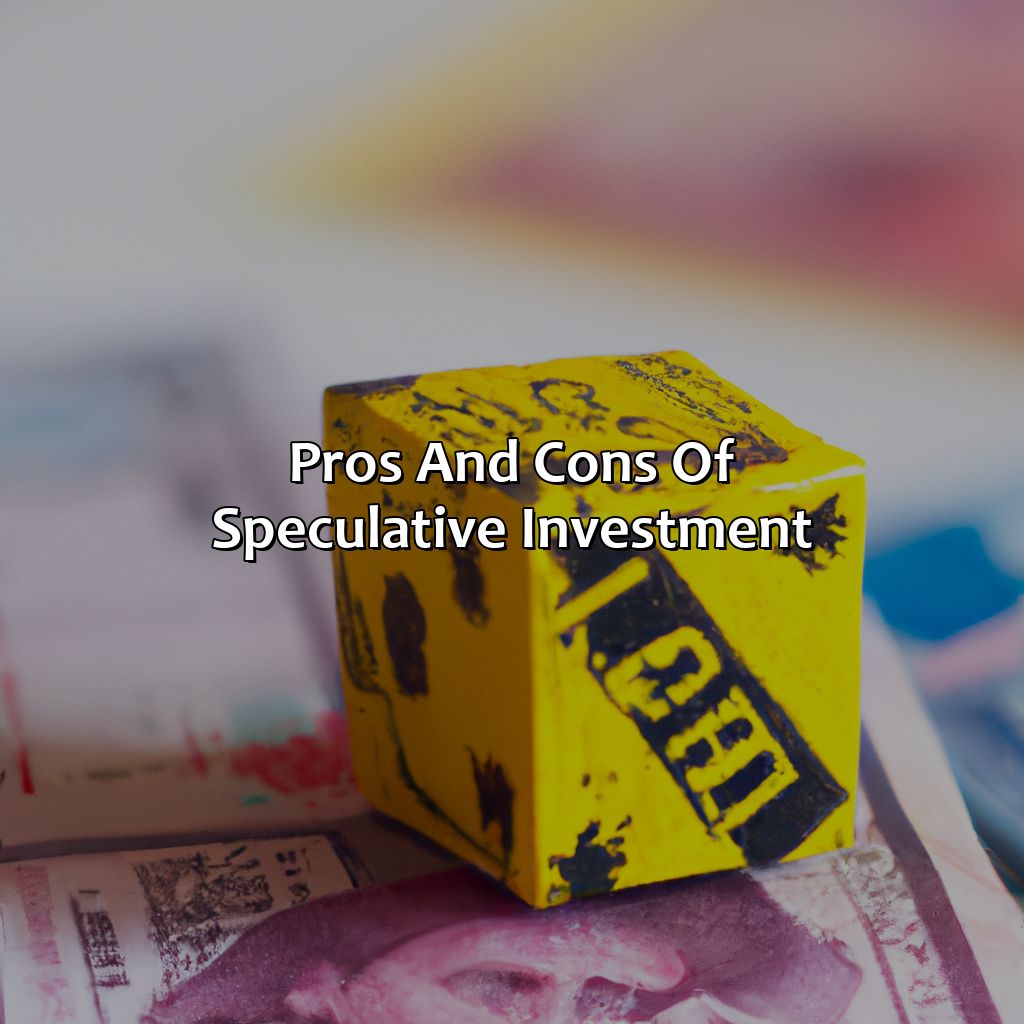
Image credits: retiregenz.com by Yuval Washington
Pros
The advantageous side of speculative investment lies in the high potential returns it can generate, making it appealing to investors seeking significant profits. Moreover, a savvy investor with thorough market knowledge can identify promising investment opportunities that others may have overlooked. Speculative investments are also flexible and allow for a diverse portfolio, creating room for investors to capitalize on a range of industries and markets. However, individual circumstances must be taken into consideration as speculative investments come with higher risk levels and require strong critical thinking and decision-making skills.
A pro tip for prospective speculative investors is to research thoroughly before pursuing investments, analyzing various factors such as historical trends, market conditions, and industry fluctuations. By engaging in rigorous due diligence practices, investors can mitigate risk levels while identifying potentially lucrative growth opportunities.
Speculative investments are like a game of Russian roulette: high risk with the potential for great reward, but you might just end up shooting yourself in the foot.
Potential for High Return
Investing speculatively can offer a great possibility of achieving substantial returns. Speculative investments carry higher risks than investing in established markets and organizations. A semantic variation of the “Potential for High Return” heading is “The possibility of significant profits through speculative investment.” This type of investment typically involves buying stocks or assets that have potential but come with a higher degree of risk than traditional investments.
Many investors are attracted to speculative investments because they offer a chance for high rewards. However, this type of investing comes with risks such as market volatility and changes in consumer demand. Additionally, it requires careful monitoring and evaluation to prevent losses.
It’s important to note that while the prospect of high returns makes speculative investing tempting, one should not solely depend on speculation without proper research and understanding. The timing of buying and selling our assets is crucial for minimizing risks. Thus, careful consideration of factors like timing, industry trends, financial status, and growth potential is necessary when engaging in speculative investing.
Pro Tip: Diversifying your portfolio can help spread risk across different assets or industries, reducing the impact on your investment from any significant losses in one specific area. Why put all your eggs in one basket when you can spread them out and make investing an omelette of success? Diversify, my friends.
Diversification
Investment spread across varying industries, geographies or asset classes is a strategy called portfolio diversification. It helps investors manage risk and avoid overexposure to one type of investment. Diversification reduces volatility and offers the prospect of better returns.
Diversification creates an opportunity for passive investment. Passive investing requires little effort since it involves allocating assets into a range of funds or securities that replicate chosen benchmark indexes at low costs. Active investors who seek higher returns can benefit from expert stock-picking skills and achieve high short-term profits.
An investor can approach diversification in several ways- among different sectors, assets classes, countries, market capitalizations or by simply holding government bonds alongside stocks in their portfolio.
Some argue that diversification limits performance because spreading resources across varying investments can dilute gains made by winners in a portfolio. However, maintaining balance in a well-diversified portfolio is key to mitigating risks.
George recently retired having invested into several stocks including Tesla at an early stage before the global shift towards electric cars occurred, his portfolio performed well which led to significant financial gain thereby providing comfort throughout his retirement years.
Speculative investments are a bit like jump scares in horror movies – they may give you a temporary rush, but the consequences can be a real nightmare.
Cons
When it comes to speculative investment, there are certain drawbacks that investors should be aware of. Here are some factors to consider before investing in speculative ventures:
- High-level of risk involved
- Unpredictable outcomes
- No guarantee of returns
- Limited information available
- Potential for fraud or scams
It is important to note that speculative investments can have varying levels of risk depending on the nature of the investment. Nonetheless, potential investors should be cautious when investing funds and properly research any prospective investment opportunities.
A crucial factor to consider is the lack of transparency surrounding these types of investments. Contracts may not always be clear, and regulatory standards may not always apply. Additionally, any potential investor must beware that past success does not guarantee future returns.
To better illustrate the challenges that come with speculative investments, consider the story of a young company that had raised a significant amount through crowdfunding platforms on promises of revolutionizing their industry. It was later revealed that the product was never developed and funds were mismanaged, leading to losses for all involved parties. This case serves as an example of how easily investors can fall prey to fraudulent schemes associated with speculative investments.
Speculative investment is like playing Russian roulette with your finances, only the revolver has more than one bullet.
High Risk
Speculative investments come with a high degree of unpredictability, which could lead to significant gains or losses. These types of investments are not for the risk-averse as they often involve investing in startups with untested business models or volatile assets like cryptocurrencies and commodities.
Investors of speculative investments need to have a high tolerance for risk and be comfortable with the possibility of losing their entire investment. They also need to conduct thorough research and analysis before investing, understanding factors such as market trends, competitors, and potential risks.
Despite the high risk involved, speculative investments can offer attractive returns that traditional investment vehicles cannot match. However, investing in speculation should be done thoughtfully with sizeable diversification across various investment options and an eye for long-term potential.
To mitigate risks associated with speculative investments, investors should consider diversifying their portfolio across multiple sectors to spread out their exposure to a single asset class. They should also set realistic expectations by understanding the potential risks and rewards and only invest capital that they can afford to lose.
While speculative investment comes with inherent risks, it can also present lucrative opportunities for investors who have a long-term strategic vision and a strong appetite for volatility. Investors who are willing to accept higher levels of uncertainty can realize outsized returns through disciplined analysis and calculated decisions.
Investment regulation? More like the Wild West. But hey, at least it adds some excitement to your portfolio, right?
Lack of Regulation
The absence of standardization poses a risk in speculative investments, as there are no uniform guidelines for governing the market. It leads to varied regulations across different regions, which can create loopholes, and result in unfair practices. Besides, lack of proper measures may encourage fraudulent activities that mislead investors and defeats the purpose of investments.
Without proper governance, speculators may take advantage of regulatory gaps by engaging in manipulative behavior or insider trading. Moreover, absence of market regulators might also lead to unreliable financial reports that misinform stakeholders’ decisions. Since there is no central body to oversee the market’s functioning, dealers and brokers have unchecked power to influence prices and manipulate markets.
Furthermore, the lack of regulation creates an environment that is challenging for novice traders as they may not know how to evaluate securities’ performance and risks. This opens them up to scams and losing their hard-earned money in unscrupulous ventures.
In 2014 a Crypto investment start-up collapsed with investor money worth $387 Million because it was run like a Ponzi scheme with no due diligence on where this investment was going. Such frauds that lure people into get rich quick schemes
without any substantial backing or regulation creates common threats that every investor should watch out for while investing.
Overall, the lack of regulation in speculative Investments can be perilous as it exposes investors to many vulnerabilities typically associated with such trades. Proper monitoring is necessary for maintaining transparency and accountability in this dynamic field.
The only thing more speculative than investing in cryptocurrencies is trying to predict the ending of Game of Thrones.
Five Facts About Speculative Investment:
- ✅ Speculative investments are high-risk, high-reward investments. (Source: Investopedia)
- ✅ The goal of speculative investing is to make quick profits by predicting the future market trends. (Source: The Balance)
- ✅ The most commonly known speculative investments include cryptocurrencies, options trading, and hedge funds. (Source: Forbes)
- ✅ Speculative investments are not suitable for everyone and require extensive research and knowledge to minimize the risk of loss. (Source: Kiplinger)
- ✅ Speculative investments have caused significant financial losses for investors in the past, including the 2008 financial crisis. (Source: CNBC)
FAQs about What Is Speculative Investment?
What is speculative investment?
Speculative investment refers to the practice of investing in assets with high risk that offer a potentially high return but the possibility of significant loss as well. These investments are usually made based on speculation instead of any fundamental analysis of the asset.
What are some examples of speculative investments?
Some examples of speculative investments include penny stocks, real estate flips, overseas currency trading, and initial coin offerings (ICOs).
What are the risks associated with speculative investments?
The risks associated with speculative investments are high due to the unpredictable nature of the assets. Investors may lose all of their invested capital due to market downturns, bankruptcies or other unforeseen circumstances.
What are the benefits of speculative investments?
The benefits of speculative investments include potentially high returns, diversification of one’s investment portfolio, and the ability to invest in emerging markets or innovative technologies.
What should an investor consider before making a speculative investment?
An investor should consider their risk tolerance, investment goals, and the potential for loss before making a speculative investment. It is also important to conduct thorough research and analysis before making any investment decisions.
Can speculative investments be made through traditional investment vehicles?
Yes, speculative investments can be made through traditional investment vehicles such as mutual funds, hedge funds, or exchange-traded funds (ETFs). However, it is important to carefully read the prospectus and understand the risks associated with these investments before investing.
